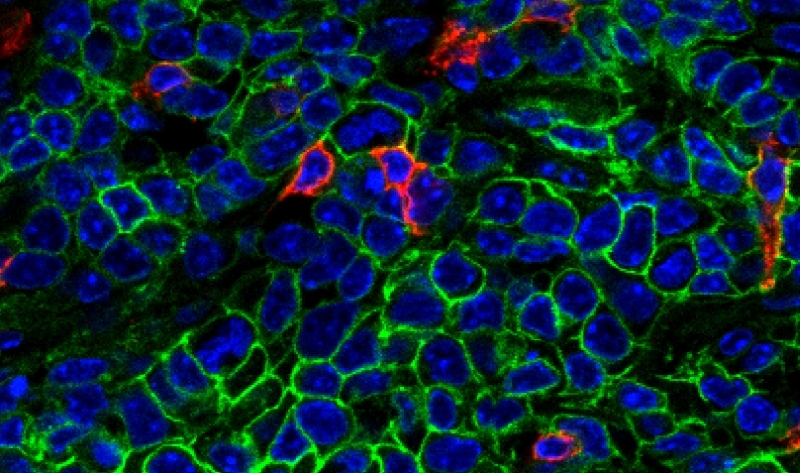Immune cells use a protein on their surface called CCR2 to guide them to sites of inflammation and to tumors. But the receptor is also expressed by breast cancer cells, and its functions there are unclear.
But wow, scientists at Cold Spring Harbor Laboratory have found that breast cancer cells can hijack CCR2 to do a totally different job—helping them evade detection by the immune system, according to a new study published in the Journal of Experimental Medicine.
Understanding the immune suppressive role of CCR2 signaling in cancer cells could open up new venues for developing immuno-oncology therapies, the researchers believe.
In a mouse model of breast cancer, loss of even one piece of gene encoding for CCR2 in cancer cells significantly reduced tumor growth rates, the Cold Spring Harbor researchers found. They further examined the biological process behind this difference.
Turns out, CCR2-expressing cancer cells create an immune-suppressive microenvironment. CCR2-negative cancer cells have higher surface levels of MHC class I—which is responsible for presenting antigen proteins to killer T cells—as well as lower levels of PD-L1, a well-known “brake” that reins in immune responses.
Perhaps most importantly, CCR2 signaling appeared to achieve immune suppression by disrupting the maturation of treelike dendritic cells, the most powerful antigen-presenting cells that are critical for the initiation of immune responses, the team showed. Compared with tumors from CCR2-expressing cancer cells, the tumors from CCR2-negatvie cells saw higher infiltration of matured dendric cells and activated CD8+ killer T cells.
Inhibitors of CCR2 are already in clinical trials. Pfizer has PF-04136309, although it’s been removed from a pancreatic cancer development program. California biotech ChemoCentryx previously showed 30% of pancreatic cancer patients who got its experimental CCR2 inhibitor CCX872 in tandem with chemo combo regimen FOLFIRINOX were still alive after 18 months. Bristol Myers Squibb is testing its CCR2/CCR5 antagonist BMS-813160 in combination with chemotherapy or PD-1 inhibitor Opdivo in solid tumors.
But earlier interest in CCR2 inhibition was based on knowledge of the receptor’s role in immune cells. For example, a 2011 Nature study suggests CCL2, by binding to its receptor CCR2, recruits inflammatory monocytes to the tumors, where they form tumor-associated macrophages. These macrophages were found to promote breast cancer metastasis.
The new findings offer a rationale for blocking CCR2 signaling in breast cancer cells to help the body’s own immune system to fight cancer. Many other approaches have been studied to restore immune defenses against breast cancer. A team at the University of Cincinnati recently showed a protein called FIP200 was responsible for limiting T-cell recruitment and activation in breast cancer.
Further work is needed to shed light on the exact mechanisms by which CCR2 signaling in cancer cells induce immune suppression in breast, the Cold Spring Harbor researchers said in their paper. For one thing, in another mouse model, the lack of CCR2 had accelerated—not reduced—tumor growth, which the authors speculated was due to different genetic backgrounds.
Better understanding of the CCR2’s role may set the stage for developing novel immune modulatory cancer therapies, the team concluded.

